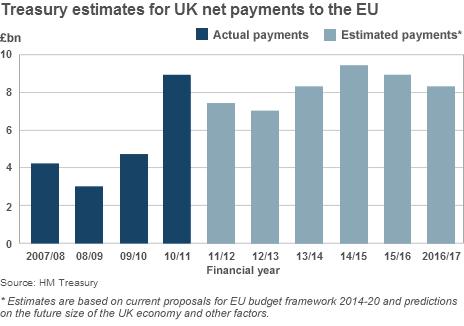George Osborne says 'real test' on EU budget to come
- Published
- comments
David Cameron: "This government is taking the toughest approach to the EU budget... in this country's history"
Chancellor George Osborne says the "real test" of the government's authority will come when any proposed EU budget deal is put before MPs.
He spoke to the BBC after Labour backed Tory rebels to defeat the government and call for a real-terms cut in EU spending between 2014 and 2020.
Mr Osborne said the government would only put to MPs any proposed deal which it thought was good for UK taxpayers.
Labour described Wednesday's defeat as a humiliation for David Cameron.
But Mr Miliband has been accused of hypocrisy and opportunism by coalition leaders.
Deputy Prime Minister Nick Clegg said Labour was well aware there was "absolutely no prospect" of achieving a real-terms cut.
"Their change of heart is dishonest, it's hypocritical. And worst of all, Labour's plan would cost the taxpayer more, not less," said the Lib Dem leader.
But Labour insists it has been pushing for a real terms cut in the EU budget since July, with shadow chancellor Ed Balls saying there had been cross-party support for the idea of reducing EU expenditure at a time of austerity at home.
"It is not about party politics, it is about the national interest. Parliament has spoken and David Cameron has got to listen and deliver," he said.
Wednesday's Commons defeat, by 307 votes to 294, is the most significant for the coalition since it came to power in 2010.
And although it is not binding on Mr Cameron, it has sparked comparisons with Sir John Major's Conservative government which was torn apart by splits on Europe in the 1990s.
The chancellor said the government would listen to "all Conservative and coalition MPs" following the vote and refused to rule out a possible a cut in the EU's budget, saying it was the "beginning of a negotiation".
He emphasised too that the real decision for MPs would come - in around a year's time - when it came to ratifying any deal the government reaches in Brussels.
"If it comes to a vote, the House of Commons will face a choice - a deal or no deal," he said - adding that the alternative to ratifying a multi-year deal would be a series of annual negotiations.
Downing Street has sought to play down the rebellion as "not altogether surprising".
Election warning
The prime minister's official spokesman said all 27 countries involved in the budget negotiations had "very different requirements" and that each have a veto.
"We are talking to other countries and trying to persuade them of our view.
"From the meeting of ambassadors in Brussels yesterday (Wednesday), it's clear from that there are lots of different positions around the table.
"We are now entering a more intensive period of negotiation."
The European Commission's proposed budget for 2014-2020 would see a 5% increase in spending on the current seven-year period.
Mr Cameron has said he will push for a freeze in the EU's long-term budget - something he says no previous British prime minister has achieved - and he has threatened to use Britain's veto if he does not get what he considers to be a good deal.
Former Conservative minister Sir Tony Baldry urged Tory MPs to get behind the prime minister in the negotiations if they "want the Conservative Party to be in government after the next general election".
But Conservative rebels said that by backing the rebel amendment Parliament would be sending a clear message and strengthening Mr Cameron's negotiating hand.
Sarah Wollaston MP, who was among the Conservative rebels, told BBC Radio 4's Today her party was "absolutely united on Europe" and Mr Cameron had been given a mandate to push for a "real cut".
The UK is the sixth highest contributor to the EU budget per capita, the European Commission says.
The net beneficiaries from the EU budget are mostly the 10 former Soviet bloc countries in Central and Eastern Europe, which joined in 2004 and 2007. Greece, the Republic of Ireland and Portugal are also net beneficiaries.
A budget analyst at the Open Europe think tank, Raoul Ruparel, says the positions of the Netherlands and Sweden are currently close to the UK government position on the EU budget.
France and Germany - big net contributors like the UK - also want a cut to the Commission's budget total, but to a lesser degree.
The 2014-2020 budget would bring a bigger shift of EU resources to the new member states in Central and Eastern Europe, so their positions may be flexible if they fear that a veto would keep the existing framework in place, Mr Ruparel told the BBC.

- Published1 November 2012
- Published1 November 2012
- Published31 October 2012
- Published31 October 2012
- Published30 October 2012
- Published30 October 2012
- Published7 October 2012